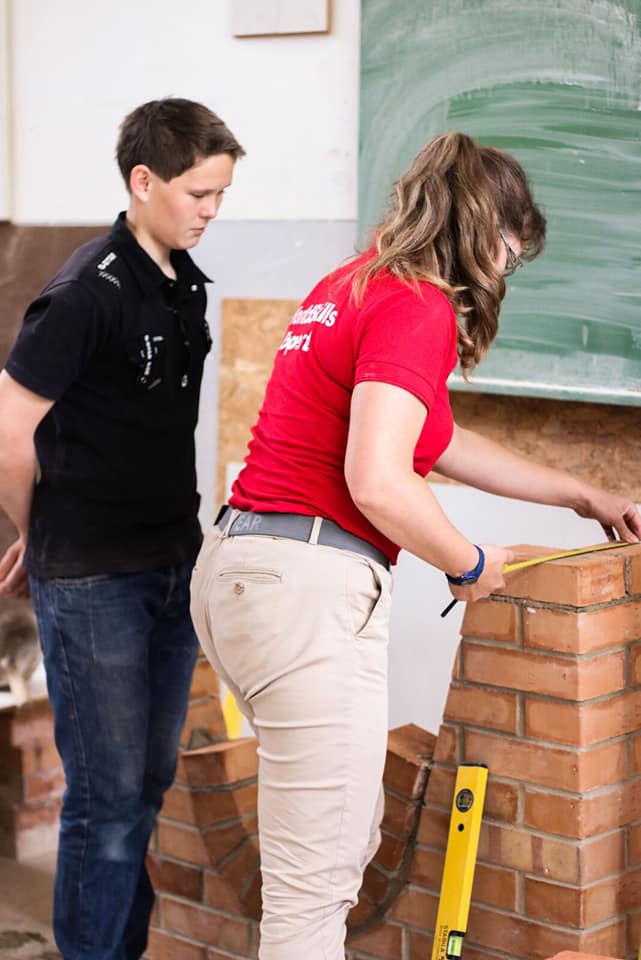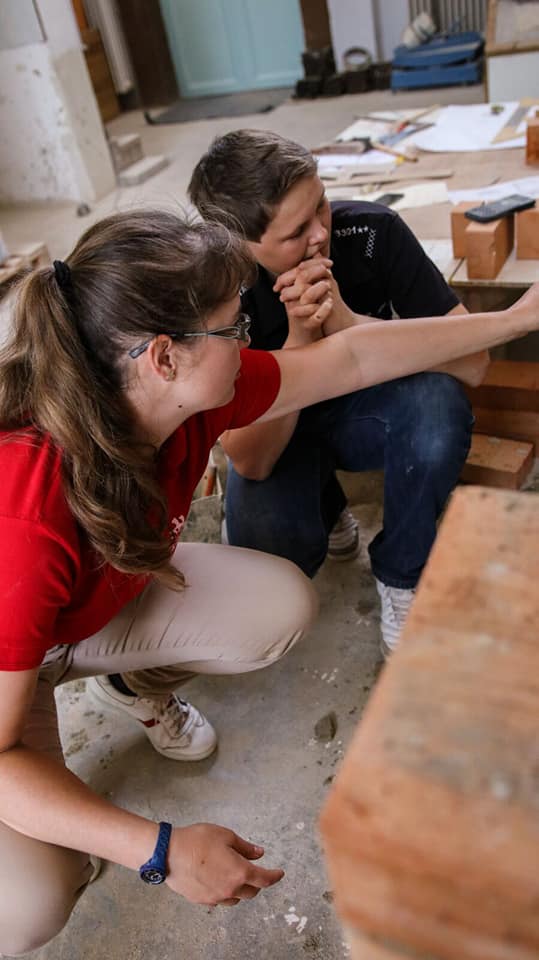
Diána Péter graduated as an architect, but today it’s only a secondary job for her. She teaches students of masonry, prepares her students for international professional competitions, while she is also involved in Skills competitions as an expert. We talked to the teacher of Széchenyi István Secondary Grammar School and Secondary Vocational School.
Around the World as a Masonry Expert

Originally, you have an MSc in architecture, but for some time, you’ve also been working as a masonry teacher, besides being a teacher of engineering. What caused this change?
It was in the air from the beginning. In my fifth year at the university, I also took courses at the Faculty of Pedagogy. I wanted to teach and deal with people. When after graduation I was offered a job at a secondary school in my home town, I didn't hesitate. My newly acquired profession remained a secondary job. In early 2014, I attended an Erasmus+ training course for instructors and specialist teachers. It was a lifetime experience, because I met an entirely new approach, and a great community of colleagues developed, which later turned into a really good network of relations.
What do you owe this programme in particular?
As part of my Erasmus studies, I was introduced into the world of Skills competitions, which determined my career thereafter. At the training course in Germany, I learnt tricks of teaching methodology, such as the basics of grout aesthetics, which also improved the quality of my own work, and it was there that I first met the practice of small brick construction.
| One of Diána’s students made it to the 2019 WorldSkills competition in Italy, where he had to make a 5-metre-tall Russia sign using small-sized bricks. |
What do you think about the international nature of Erasmus+? How much does it matter in the world of labour, as well as from the point of view of our future?
It matters a lot. There are various educational systems in the European Union, but the challenges to be met and the arising generation issues are the same. It’s of key importance, both in terms of methodology and innovation, that we know each other's best practices. A current example for that is the vocational training system, introduced only recently in Hungary, many elements of which is also found in the German educational system. It’s also crucial how quickly we can effectively apply and improve all this, not only because of the students, but also because of the market.
At the school, you also had a partnership project, in which you acted as a coordinator. What do you consider the main benefits of the partnership?
In the TWIN KA2 project, I had an opportunity to follow an international strategic partnership for years. It was interesting to see, for example, how the Polish colleagues related to using phones during classes. Practically, the students programmed the computers from their phones. But it was also there that I learnt how to equip an apprentice workshop conveniently, how and where to store students’ tools and equipment, which may sound trivial, but it makes working with the students much easier. The ‘afterlife’ of the programme was a twin school and student exchange programme.
How important are personal meetings for the success of the programmes?
New techniques and tricks are impossible to share with each other in writing or online. Students must see in real life how, for example, mortar changes during mixing. We, too, need to try the new techniques and materials, because only then can this knowledge become part of our toolkit, and only then can we transfer the new skills and tricks to our students. No wonder that, even in the times of guilds, craftsmen would regularly go on journeys during their apprentice years and later.

What, in your opinion, do students consider the main benefit of these programmes?
For the students, it’s a formative experience to work and think together with peers from other countries. Our school launched a KA2 project in which they learnt how to overcome linguistic difficulties, and became familiar a foreign culture and customs through focusing on a technical issue. Also, this and the good academic performance together meant an immense motivation. In fact, such projects open up the world for students, teachers and schools, too, and we even received funding for that.
In the past three years, you participated in national and international Skills competitions as an expert. How important were these years of your life?
Hungarian experts are also a very close-knit and helpful community, and play a leading role in Hungarian vocational training. It was a great honour and privilege to belong to them; however, the greatest opportunity and experience in my life was to work together with masonry experts from six continents, from about 36 countries. I had lots of valuable conversations and made valuable friendships, not to mention the experience of working together with talented young people.
What presents the greatest challenge for you currently?
Despite our modernisation efforts that I mentioned, we still have some outdated educational materials which we currently need to build on. The question is how we could bring them closer to today’s youths. I also consider it a serious challenge that we need to follow the changes of the market. The only solution, in my opinion, is continuous learning and self-instruction again. I hope we set a good example for students with this latter, because they must be aware that without flexibility and renewal, they won't be able to remain competitive.
Last modified: 27-07-2020















